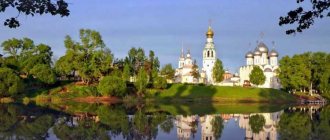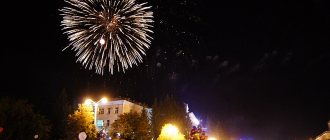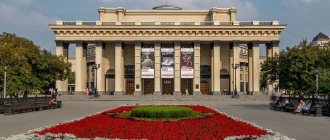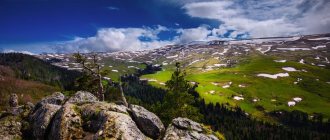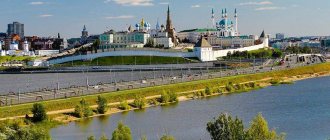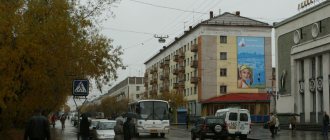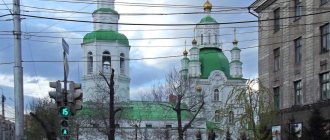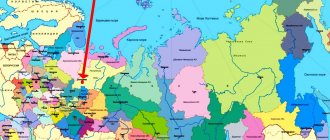Dyatlov Pass
This is a rather beautiful and picturesque place, which is located in the Northern Urals. The tract is located next to the Auspiya River and a tributary of the Lozva River, not far from the village of Solatchakhl. The pass received this name after a tragedy occurred in 1959 with an expedition led by Igor Dyatlov. Despite the fact that many years have passed since those dramatic events, this story is still shrouded in mystery and some mysticism, and the circumstances of the death of 9 people are considered unclear.
Kazhimskaya Dam
Photo source: koigorodok.ru
The dam, which protected nearby settlements from flooding, was built in 1757–1758. The reservoir and dam were built to supply water for the iron foundry blast furnace. Handicraft metal smelting grew into a small metallurgical plant.
Over time, a hydroelectric power station was built. Now it is a whole complex of buildings protected by the state. Next to the industrial-historical site, the Dmitrov Church was erected in the style of Russian classicism. Now the power of the hydroelectric power station has been reduced, and the facility itself is being restored.
7
The top of Mount Otorten
The mountain is located on the border of the Komi Republic and the Sverdlovsk region. The climate is cold, so you can ski here even in July, and people often encounter wild animals. The area, although fantastic, has a bad reputation, since people often died here under unclear circumstances, in particular, the expedition of I. Dyatlov died here. It is this inaccessibility and mysticism of Mount Otorten that attracts many tourists.
Yugyd Va Nature Reserve
The largest national park in Russia. This place is truly unique for its wealth of various rare biological resources and the variety of preserved monuments of history, culture, and nature. This reserve is located at the highest point of the Ural Mountains, at the junction of the borders of Asia and Europe. The highest point is Mount Narodnaya, which reaches a height of 1895 meters.
Souvenirs
Handicrafts are popular among travelers who want to leave a pleasant memory of their trip to the republic. People willingly bring bags, wallets, gloves, sleeveless jackets, hats and belts made of deer fur, birch bark tueskas, wooden crafts and folk embroidery from Komi. Delicious souvenirs in demand include smoked venison, trout, salmon, dried mushrooms, jam and fresh berries - cranberries, lingonberries, blueberries, blueberries and cloudberries.
| ← RUSSIA | EUROPE → |
Man-Pupu-Ner or Ventilation pillars
This is a geological monument of the north of Komi. Ventilation pillars are one of the seven wonders of Russia; a huge number of legends and myths are associated with them. Many peoples considered these mountain protrusions to be frozen giants, who were not necessarily kind and generous, but rather had a somewhat negative connotation. The plateau, where the majestic mountain pillars are located, is located quite far from inhabited places, but if desired, with an experienced guide it is possible to reach them.
Oil mines of Yarega
Photo source: savepechora.ru
One of the wonders of Komi was formed as a result of anthropogenic impact. This is the only place on our planet where oil is extracted from the depths of the earth using a mine method.
Oil fields are a real pearl of the North. A rare variety of valuable petroleum product is extracted here. As a result of oil extraction, amazing workings were formed, and tourists have the opportunity to directly look into the oil reservoir.
6
Trinity-Stephano-Ulyanovsky Monastery
It is located in the Ust-Kulomsky district of the Komi Republic, just under 200 km from Syktyvkar on the banks of the Vychegda River. It was founded in the 14th century by Saint Stephen of Perm and is famous for its large number of original buildings, which have partially survived to this day. In the 20th century, the monastery was considered one of the largest in Russia; after the revolution, unfortunately, it was significantly destroyed, but has now been restored and reconstructed. And in 1994, the relics of the builder fathers were found there, who were ranked as saints.
Fishing
The pristine nature of Komi attracts many fishermen. Fishing is done on rivers and lakes, and no one returns home without a good catch. In Komi there are grayling, taimen, whitefish, pike, ide, burbot, ruffe and crucian carp.
In addition to an exciting pastime, fishing allows you to get acquainted with beautiful nature. The shores of the clear lakes are overgrown with rare plants - yellow Lapland poppy and healing golden root. Near the water lie large boulders that remained here after the Ice Age.
Settlement Yb
The center of ethnographic tourism is located 55 km from Syktyvkar, on the banks of the Sysola River. YB is translated as “elevation.” In ancient times, scientists suggest that Chud tribes lived there, who had their own faith, their own way of life, and for a long time they did not want to join Christianity. In this village there is a Finno-Ugric ethnopark, where various ethno-festivals, a historical and ethnographic museum, the Chud settlement, and the Ascension Church are held.
Halmer-Yu
One of the ghost towns of Russia, which is located in Komi, near Vorkuta. The name of this village, translated from Nenets, means “river in the valley of death.” Here, in the middle of the tundra, near the mountains, Khalmer-Yu was lost, with many residential buildings, with administrative buildings, but completely abandoned by people. Fans of extreme sports and urban travel will feel very happy here. At one time, a lot of coal was mined there, but in the 90s, residents of the village were forced to move to larger cities due to lack of work.
There are many beautiful places in Russia that are loved by tourists. The Komi Republic can also attract tourists with its delightful natural areas, historical sites and mysterious stories. Of course, many people remember one of the seven wonders of Russia - the famous weathering pillars on the Manpupuner plateau, which are considered the hallmark of Komi. The BNK agency has chosen ten of the most unique and mysterious places in the republic, not so well known to a wider audience, but no less attractive for that reason.
Photo by Sergei Vishnyakov, vk.com
Spherical nodules in the Izhma River. Village Maloye Galovo
Stone balls on the banks of the Izhma River are located a few tens of meters from the village of Maloye Galovo; locals call them “Galfedsa Izyas”. It happened that residents used them for medicinal purposes - they lay on warm stones to relieve lower back pain. There is an opinion that stones are able to “charge” people with energy. From the scientific side, these are siderite nodules, consisting of iron carbonate, which fell out of the rock mass when the river washed away the shore.
Photo mindraw.web.ru
Halmer-Yu: abandoned village and waterfall. Vorkuta
The peculiar Pripyat, an abandoned village beloved by Republican stalkers, is located just 60 kilometers from the polar Vorkuta. In 1942, working seams were discovered on the Khalmer-Yu River; coal from the new deposit was one of the most valuable grades for coke production. The mine began operation in the late 50s and produced about 250 tons of coal per day. However, in the early 1990s, the Russian government issued a decree to liquidate the mine. In the fall of 1995, the liquidation of the village was supposed to be completed; during the eviction, riot police were used: doors were knocked down, people were forcibly driven into carriages and taken to Vorkuta. After closure, the area is used as a military training ground. Extreme lovers also come here for the romance of abandoned houses.
25 kilometers from it is the Buredan Waterfall, one of the largest waterfalls in the European part of Russia. It consists of three stages and is the end of a series of cascading rapids. The total height of the water fall is more than 10 meters.
Photo: halmer-u.info
Rock Tatar Mosque. Ichthyological reserve "Ilychsky"
Tatar Vichko or Tatar Mosque are picturesque rocks in the upper reaches of the Ilych River, in the area of the Tatar River. They are weathered forms reminiscent of the minarets of Muslim mosques. The rocky outcrops last for 45 meters and begin with a double-headed rock, one of the peaks of which, up to 30 meters high, resembles the minaret of a Muslim mosque. The pointed tops of the rocks expand downward into a tent.
Photo: quist.pro
Swamp Ocean. Ust-Tsilemsky district
The largest swamp in Europe is located in the Ust-Tsilemsky region of the republic. Its depth is 1.6 meters and its area is almost 200 thousand hectares. This is an extensive forest-swamp system with many rivers and lakes rich in fish. Its uniqueness was recognized almost 40 years ago, but it has not yet been fully studied.
Photo restbee.ru
"White Walkers". Vuktylsky district
Not far from the Mansi boobies on the Manpupuner plateau there is Mount Timaiz, where unique fairy-tale snow boobies are located, nicknamed “white walkers” by BNK readers. Winter winds compact the snow on the trees and instead of small spruce trees, fabulous figures appear, among which it is no longer possible to discern the coniferous beauties. Under the weight of snow, trees bend and form various snow arches and tunnels. Here you can walk for hours, discovering the limitless possibilities of nature. You can see the “white walkers” 30 kilometers from Vuktyl.
Photo by Sergei Vishnyakov, vk.com
Multi-stemmed spruce. Ust-Kulomsky district
A century-old Christmas tree grows in the village of Ruch, Ust-Kulomsky district. Its unusualness lies in its multi-trunk nature: the forest beauty has a single base, and then it is divided into several trunks, which makes the spruce very lush. The gorgeous tree was previously looked after by a local resident, who died about ten years ago, having almost reached, like the spruce itself, a century old. There is a legend that the tree has mysterious powers. But no one knows which one yet.
Photo by Nikita Grigorchuk, vk.com
Mount Manaraga. Ural
Translated from Nenets, “Manaraga” means “like a bear’s paw.” The truly dissected ridge of the mountain resembles a clawed bear's paw. For a long time, Manaraga was considered the highest peak of the Urals, until in 1927 it was determined that Mount Narodnaya was 200 meters higher. In ancient times, Mount Manaraga was considered a sacred place; except for shamans, there was no way for any mortal to go there. The shamans, before climbing to the top, appeased the mountain with their offerings. And in our time, not everyone is destined to rise to the top of the “bear’s paw”.
Photo liveinternet.ru
The mysticism of the village of Kargort. Syktyvdinsky district
The village of Kargort was first mentioned in a scribe book back in 1586, but people began to live here much earlier. There is a legend that on the site of the current village there was a site of the ancient Chud people. Old-timers claim that sometimes moans and screams are heard from the depths of the earth, and at midnight on the road near Kargort, car engines stall and headlights turn off. If you're lucky, you can see the miracles themselves, emerging from the ground at night. A similar story is described by user Yaropolk in blogs. In 2006, he went to Yba, where he had never been, to hunt. Before reaching Kargort, his car suddenly stalled, and he decided to look for housing to spend the night. Having passed part of the way through the forest, and almost falling into a swamp, the hunter came to a lake and a small village. There he was met by an old man who invited him to spend the night and wash himself in the bathhouse. The man agreed, had dinner, went to the bathhouse and went to bed. In the morning, having said goodbye to the old man, he went towards Yb. Imagine his surprise when, after a kilometer of travel, his phone rang, and the car, which had been left on the road since the evening, started up. Having learned about the night journey, the friends told the hunter that there were no villages in this place, and it was impossible to go the way he had walked at night.
Photo by Valentin Timchenko
Magic trees in the Pagan Grove. Kortkeros district
There are a number of unusually shaped trees here that are about 400 years old. At the same time, birch grows together with spruce, fir with pine - this does not happen in nature, and if you do this on purpose, one species will certainly displace the other. And there are 17 of them in the grove. They intertwine, bifurcate and unravel, bend at unnatural angles, and merge with representatives of other species. Without a doubt, it is mysterious and mysterious here - this is the Pagan Grove. According to one version, representatives of ancient tribes gathered in the grove and united the tribes through marriages - “purified the blood” - and planted different tree species in the ground as an eternal symbol of their lifelong blood connection.
"Yirkap Ski". Komi National Museum
A fragment of a Mesolithic ski with a sculptured moose head on the toe is the oldest known ski found on the planet. A unique find is found in the National Museum of the Komi Republic. The artifact was found in 1964 in the Vissky peat bog near Lake Sindorsky in the Knyazhpogost region. With the help of journalists of those years, the find was dubbed the “Yirkap ski” - after the legendary hero of Komi mythology, a hunter, owner of a magic ski. The age of the fragment and the material from which it was made were established during the restoration carried out by the State Hermitage: pine from the last quarter of the 6th millennium BC.
Photo by Andrey Retanov
Surely there are many more interesting and mysterious places in our republic. The BNK agency invites readers to report them. You can share fascinating stories and talk about the most mysterious places in your area in several ways: write an email to the editor-in-chief, use the “People's Correspondent” button at the top of the site, write a personal message to the editors on the social network of the agency “VKontakte” or suggest news on BNK group.
Mount Narodnaya
The highest peak of the Urals, its height above sea level is about 1900 meters, is located in an inaccessible place, which is not so easy to reach, between the Karpinsky and Didkovsky mountains. A.N. is considered its discoverer. Aleshkova. The mountain is composed of quartzite and schist and has a dark rock color. Nearby is Goluboye Lake, a favorite stopping place for tourists, and the Naroda River flows below. The mountain amazes with its majesty and difficult to reach height; it is located on the territory of the Yugyd-Va park-reserve.
Tourist routes
Trinity-Stephano-Ulyanovsky Monastery
The vast area of land is poorly developed by people, so pristine forests and wetlands have been preserved in Komi. There are 240 protected areas in the republic, two of which are of federal significance. Lovers of natural attractions began to explore the territory of Komi a very long time ago, and today tourism has become one of the significant sectors of the region’s economy.
Most groups travel through the valleys and peaks of the Subpolar Urals. Popular among tourists are the climbs to Narodnaya, Kolokolny, Manaraga, Yanchenko, Zashchita, Neroika, Mansi-nyor, Ural and Karpinsky. They come to the mountains to see beautiful waterfalls, bizarre rocks and relict glaciers.
Holy Ascension Church in the village of Yb
Almost all routes to the heart of the most elevated part of the Ural ridge begin from Inta. Some groups start from Pechora and get to the beautiful alpine peak Sablya through the extensive Aranets swamps.
The mountains and foothills are home to many wild animals. In the forests and on the slopes you can meet bears, moose, foxes, squirrels and hares. Reindeer grazing routes pass through the western spurs of the Ural Mountains. During hikes, tourists get acquainted with reindeer herders - Zyryans, Khanty and Mansi, visit their tents and try a real delicacy - delicious reindeer meat.
The Balbanyu River in the Yugyd Va National Park
In addition to hiking and mountain tourism, skiing and cycling tourism are developed in the Subpolar Urals. Among fans of water travel, kayaking, rafting and rafting along the Vychegda, Shchugor, Sysol, Pizhma, Lemva, Kos-yu, Shar-yu and Kozhim are popular.
The unpopulated area and lack of roads make most of the republic inaccessible. Travelers reach remote areas by helicopters, motorboats, all-terrain vehicles and off-road trucks.
Ybsky Seraphim Convent
Tourists have to overcome severe hiking difficulties. They travel many kilometers on foot, carry heavy backpacks and cope with hordes of mosquitoes and midges. Their path is blocked by stormy rivers, rock slides and deep canyons. For these reasons, only well-prepared sports groups decide to travel long distances around Komi.
